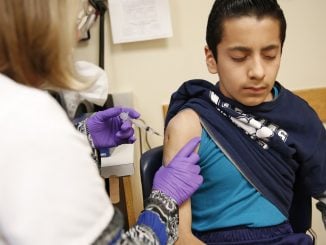RALEIGH — In recent weeks, the Centers for Disease Prevention and Control (CDC) “streamlined” its COVID-19 guidance and it has implications for K-12 students now heading back to the classroom.
“We’re in a stronger place today as a nation, with more tools—like vaccination, boosters, and treatments—to protect ourselves, and our communities, from severe illness from COVID-19,” Greta Massetti, PhD, MPH, MMWR author said in an Aug. 11 CDC press release. “We also have a better understanding of how to protect people from being exposed to the virus, like wearing high-quality masks, testing, and improved ventilation. This guidance acknowledges that the pandemic is not over, but also helps us move to a point where COVID-19 no longer severely disrupts our daily lives.”
One key change affecting K-12 students is the removal of “test-to-stay” policies, meaning students will no longer have to show a negative COVID test to stay in the classroom. Many districts viewed “test-to-stay” as a way to keep in-person learning and avoid quarantining students.
Parents wary of district attempting to re-mask their children may have more fights with their school boards in the near future.
In an interview with National Public Radio, Massetti made the assertion that dropping “test-to-stay” as a quarantine alternative now means “the practice of handling exposures would involve masking rather than a quarantine.”
Despite Massetti’s claim, masking is only recommended but not required when county community levels are “high” in both the CDC streamlined guidance and school-specific guidance.
The CDC’s update no longer recommends quarantining for students who may have been exposed to someone who tested positive for COVID-19 either while in or outside of school, but it does recommend anyone exposed should wear a mask for 10 days following exposure.
Additionally, the update says school administrators should “decide how to manage exposures based on the local context and benefits of preserving access to in-person learning.”
The update goes a step further, however, stating “Schools might need to require masking in settings such as classrooms or during activities to protect students with immunocompromising conditions or other conditions that increase their risk for getting very sick with COVID-19 in accordance with applicable federal, state, or local laws and policies.”
The update also suggests “accommodations may be necessary” for those who have trouble or cannot wear a mask.
School districts in North Carolina offered mask exemptions through which families could apply for but were rarely granted. In Wake County Public Schools, parents reported mask exemptions were being actively denied. One parent who is now running for a seat on the Wake County School board spent almost six months battling the district’s policies of denying mask exemptions.
This latest round of CDC changes also states that “The CDC’s recommendations are not legally binding” and that “Many cities, states and school districts will review them but may ultimately follow different strategies.”
During the pandemic, North Carolina school districts and school boards almost unilaterally relied on N.C. Department of Health and Human Services (NCDHHS) for guidance via the StrongSchools NC Toolkit.
On June 23, NCDHHS quietly sunset the toolkit. In a press release, the agency said that “Going forward, school administrators, staff, and families should now refer to the CDC’s Operational Guidance for K-12 Schools for information on how to lower risk of COVID-19 in school settings.”
NCDHHS has also dropped recommending masking in all childcare facility settings and programs.
The CDC’s “streamlined” guidance still pushes vaccinations for people of all ages, however, the quarantine guidance appears to distinguish between a vaccinated and unvaccinated person.
A summary of the key updates includes:
- Instead of quarantining for those exposed to COVID-19, a person can wear a high-quality mask for 10 days and get tested on day 5.
- Recommends staying home for at least 5 days and isolate from others in your home if you test positive for COVID-19 and after 5 days wearing a high-quality mask when around others at home and in public.
- If after 5 days you are fever-free for 24 hours without the use of medication, and your symptoms are improving, or you never had symptoms, you may end isolation after day 5.
- Universal masking only recommended for “high” county community transmission levels.
- De-emphasizes the “six-feet” social distancing guideline previously relied on.
- Encourages the public to have “vaccine confidence.”
- Dropping screening programs of persons with no symptoms.
The CDC has also indicated that testing related to COVID community levels, including those at a higher-risk or incidence, such as nursing homes or prisons, is more useful than screening in schools.
On the same day the CDC issued its COVID guidance changes, NCDHHS also rolled out its “Know Before You Go Campaign,” which is a “statewide initiative reminding North Carolinians to stay up to date on COVID-19 vaccines and boosters in time for the start of the 2022-2023 school year, fall festivities, large gatherings and end-of-year celebrations and holidays.”
“Whether it’s COVID-19, mental health and well-being or other public health needs, every North Carolinian should have easy access to the information they need to know to protect themselves and others before they go about their daily routines,” NCDHHS Secretary Kody Kinsley said in the release.
The main target of the campaign appears to be K-12 and college-aged students.
According to the NCDHHS press release, “To date, more than 185 public and independent K-12 schools across 50 counties throughout the state have signed up for the campaign.”



